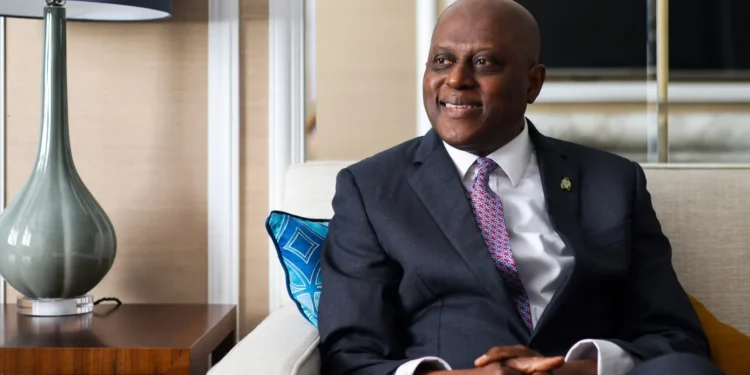When the Central Bank of Nigeria (CBN) began what many saw as a high-stakes gamble to reform the foreign exchange market, sceptics warned that the short-term pain would be deep. But a year later, the numbers tell a different story: foreign investors are returning, and the flow of dollars into Nigeria’s financial system is rising at a pace not seen in years.
Data from FMDQ shows that total inflows into the Nigerian Foreign Exchange Market (NFEM) surged by 62.2 percent month-on-month to $5.15 billion in October from $3.18 billion—a five-month high. The National Bureau of Statistics (NBS) puts total capital inflows in the first quarter of 2025 at $5.6 billion, up 67 percent from the same period a year earlier.
For many stakeholders, this rebound signals that investor confidence, battered by years of currency controls and multiple exchange rates, is being rebuilt under CBN governor Olayemi Cardoso.

“Financial sector stability is buoying investors’ confidence in the domestic economy,” said one investment analyst in Lagos.
Cardoso’s clean-up and the confidence effect
Since assuming office in October 2023, Cardoso’s approach has been deliberate: clear the backlog of trapped foreign exchange obligations, unify the multiple exchange rates, and gradually withdraw the central bank’s heavy hand from the market.
Those steps have begun to pay off. The CBN’s clearing of more than $7 billion in FX backlog was described by the World Bank as a “bold intervention” that improves long-term economic sustainability.
At the same time, Nigeria’s sovereign risk spread has fallen to its lowest since January 2020, erasing the pandemic-era premium that had scared off foreign portfolio investors.
“The surge reflected strong participation from both foreign and domestic investors, supported by improving market sentiment and the global shift toward monetary policy easing,” said Cordros Securities Limited in a note to investors.
Foreign inflows accounted for 64.5 percent of the total in October, rising nearly 90 percent to $3.32 billion. The biggest driver, Cordros said, was a 120 percent jump in foreign portfolio investment (FPI), particularly in money market instruments, which now dominate capital imports.
Domestic inflows also increased 28.4 percent, largely from individual and corporate investors encouraged by more transparent market conditions.
Cordros expects this momentum to continue. “We anticipate total FX inflows from both domestic and foreign sources will remain robust, surpassing the 2024 average of $2.51 billion, driven by sustained market confidence and still-attractive carry-trade opportunities,” it said.
Portfolio capital leads the charge.
The latest NBS data show that portfolio investment now accounts for more than 92 percent of Nigeria’s total capital inflows. In Q1 2025, it rose 150.8 percent year-on-year to $5.2 billion.
“The bulk of the FPI flows was to money market instruments, up 162.2% year-on-year to $4.2 billion,” said Ike Chioke, managing director of Afrinvest West Africa Limited. “Bonds and equities also recorded strong growth.”
The banking sector emerged as the biggest beneficiary, attracting 55 percent of total inflows, or about $3.1 billion, in the first quarter. The financing sector followed closely with $2.09 billion.
The United Kingdom remains Nigeria’s top investment partner, accounting for 65 percent of all capital imported.
A rebased economy, a bigger canvas
Nigeria’s economy is also being redrawn—literally. The rebasing of the Gross Domestic Product (GDP) provides a clearer picture of an economy that has evolved significantly since 2010.
“In nominal terms, the rebased GDP for 2019 stood at N205.09 trillion, rising steadily to N372.82 trillion in 2024,” said Statistician-General Adeyemi Adeniran. “It’s not just about a bigger number but about accurate, timely data that supports smarter policy and economic planning.”
The rebased data reveal a structural shift: agriculture and services now account for a larger share of nominal GDP, while industry’s contribution has fallen.
Economist Aliyu Ilias noted that the update gives long-overdue visibility to previously under-represented sectors like entertainment and creative industries. “This new visibility will make Nigeria appear stronger to foreign investors, which will naturally help us attract more capital,” he said.
He added that rebasing “creates a more reliable framework for fiscal planning and development interventions”, allowing the government to allocate resources more effectively.
Seun Onigbinde, director of BudgIT, agreed, saying rebasing “must reflect policy evolution” in sectors like telecommunications and banking. “It allows the government to better measure tax efficiency, design social programmes, and gauge sectoral growth with precision,” he added.
Banking on the banks
To sustain growth and prepare for a larger economy, the CBN is pushing commercial banks toward recapitalisation, a move reminiscent of the mid-2000s reforms that transformed Nigeria’s financial system.
“Will Nigerian banks have sufficient capital relative to the financial system’s needs in servicing a $1 trillion economy in the near future? In my opinion, the answer is no—unless we take action,” Cardoso told bank executives recently.
That action, he said, is the ongoing recapitalisation drive aimed at positioning banks to support large-scale transactions in infrastructure, energy, and manufacturing—critical sectors for the government’s 2030 $1 trillion GDP target.
The Policy Advisory Council’s blueprint for achieving this goal prioritises investment in power, housing, and digital technology, with the banking sector playing a central role in funding expansion.
What investors are seeing
The tone among international investors has shifted. Just a year ago, Nigeria’s FX policy was widely criticised for deterring foreign participation. Today, global fund managers speak of a country “back in business”.
“Nigeria appears to be back in business as long-awaited economic reforms take shape,” said Emre Akcakmak, portfolio manager at East Capital. “Key measures include improved currency liquidity, leeway for investors to repatriate profit, and a stable naira.”
Standard Chartered’s head of Africa strategy, Samir Gadio, told Bloomberg that “portfolio inflows have likely been supported by improved confidence amid key structural reforms, better FX market functioning, and moderating dollar-naira volatility.”
He added that Nigeria’s local market “is seen as less correlated with global risk conditions than more liquid emerging-market peers.”
A quiet rebound amid global uncertainty
Even as U.S. President Donald Trump’s renewed trade rhetoric rattles emerging markets, Nigeria’s FX and capital inflows have remained resilient. For a country that once symbolised policy unpredictability, the change is striking.
Yet analysts warn that sustaining this momentum will require discipline. “We must acknowledge that genuine economic growth extends beyond statistical adjustments,” said Lagos-based economist Nelson Adedeji. “For ordinary Nigerians to feel the impact, reforms must tackle infrastructure, security, and manufacturing competitiveness.”
Others agree that reforms must now translate into tangible benefits for households and businesses. “Rebasing or rising inflows mean little if inflation and unemployment remain high,” noted BudgIT’s Gabriel Okeowo. “Policymakers need to ensure that capital inflows fund productive sectors, not just speculative ones.”
From stabilisation to acceleration
The story of Nigeria’s recent FX reforms is one of quiet rebuilding – of credibility, confidence, and clarity. By aligning the naira closer to market forces and cleaning up the central bank’s books, the Cardoso-led CBN has reopened doors that were long closed to international investors.
Still, the work is far from done. Sustaining the gains will depend on consistent policy, political stability, and continued transparency in the FX market.
But for now, the numbers tell a hopeful story: investors are coming back, the naira is steadier, and Nigeria’s path to a $1 trillion economy looks less like a dream and more like a plan in motion.
As Akcakmak put it, “Nigeria is again on investors’ radar—not because it’s perfect, but because it’s reforming.”
Stay ahead with the latest updates!
Join The Podium Media on WhatsApp for real-time news alerts, breaking stories, and exclusive content delivered straight to your phone. Don’t miss a headline — subscribe now!
Chat with Us on WhatsApp








